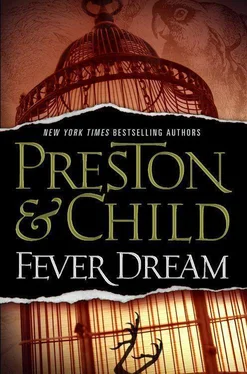Douglas Child - Fever Dream
Здесь есть возможность читать онлайн «Douglas Child - Fever Dream» весь текст электронной книги совершенно бесплатно (целиком полную версию без сокращений). В некоторых случаях можно слушать аудио, скачать через торрент в формате fb2 и присутствует краткое содержание. Жанр: Триллер, на английском языке. Описание произведения, (предисловие) а так же отзывы посетителей доступны на портале библиотеки ЛибКат.
- Название:Fever Dream
- Автор:
- Жанр:
- Год:неизвестен
- ISBN:нет данных
- Рейтинг книги:3 / 5. Голосов: 1
-
Избранное:Добавить в избранное
- Отзывы:
-
Ваша оценка:
- 60
- 1
- 2
- 3
- 4
- 5
Fever Dream: краткое содержание, описание и аннотация
Предлагаем к чтению аннотацию, описание, краткое содержание или предисловие (зависит от того, что написал сам автор книги «Fever Dream»). Если вы не нашли необходимую информацию о книге — напишите в комментариях, мы постараемся отыскать её.
Fever Dream — читать онлайн бесплатно полную книгу (весь текст) целиком
Ниже представлен текст книги, разбитый по страницам. Система сохранения места последней прочитанной страницы, позволяет с удобством читать онлайн бесплатно книгу «Fever Dream», без необходимости каждый раз заново искать на чём Вы остановились. Поставьте закладку, и сможете в любой момент перейти на страницу, на которой закончили чтение.
Интервал:
Закладка:
"Amen to that." And with a certain relief, Hayward thought that it was a good thing she wouldn't be working with Pendergast much longer. She had enjoyed that just a little too much.

80
New York City
DR. JOHN FELDER SAT IN HIS CONSULTING OFFICE in the Lower Manhattan building of the New York City Department of Health. It was on the seventh floor, where the Division of Mental Hygiene was located. He glanced around the small, tidy space, mentally assuring himself that everything was in order: the medical references in the bookshelves lined up and dusted, the impersonal paintings on the wall all perfectly level, the chairs before his desk set at just the right angle, the surface of his desk free of any unnecessary items.
Dr. Felder did not normally receive many guests in his office. He did most of his work--so to speak--in the field: in locked wards and police holding tanks and hospital emergency rooms, and he carried out his small private practice in a consulting room on lower Park Avenue. But this appointment was different. For one thing, Felder had asked the gentleman to see him, not the other way around. The psychiatrist had done a background check on the man--and what he learned was rather disconcerting. Perhaps the invitation would prove to be a mistake. Even so, this man seemed to be the key, the only key, to the mystery of Constance Greene.
A quiet double tap sounded at the door. Felder glanced at his watch: ten thirty precisely. Punctual. He rose and opened the door.
The apparition that stood in the doorway did little to relieve Felder's misgivings. He was tall, thin, and immaculately dressed, his pallid skin a shocking contrast to the black suit. His eyes were as pale as his skin, and they seemed to regard Felder with a combination of keen discernment, mild curiosity, and--perhaps--just a little amusement.
Felder realized he was staring. "Come in, please," he said quickly. "You're Mr. Pendergast?"
"I am."
Felder showed the man to one of the consultation seats and then took his place behind the desk. "I'm sorry, but it's actually Dr. Pendergast, isn't it? I took the liberty of looking into your background."
Pendergast inclined his head. "I have two PhDs, but, frankly, I prefer my law enforcement title of special agent."
"I see." Felder had interviewed his share of cops, but never an FBI agent, and he wasn't quite sure how to begin. The straightforward approach seemed as good as any.
"Constance Greene is your ward?"
"She is."
Felder leaned back in his chair, casually throwing one leg over the other. He wanted to make sure he gave the impression of relaxation and informality. "I wondered if you could tell me a little more about her. Where she was born, what her early life was like... that sort of thing."
Pendergast continued to regard him with the same neutral expression. For some reason Felder began to find it irritating.
"You are the committing psychiatrist in the case, are you not?" Pendergast asked.
"My evaluation was submitted as evidence at the involuntary-commitment hearing."
"And you recommended commitment."
Felder smiled ruefully. "Yes. You were invited to the court hearing, but I understand that you declined to--"
"What, precisely, was your diagnosis?"
"It's rather technical--"
"Indulge me."
Felder hesitated a second. "Very well. Axis One: schizophrenia of the paranoid type, continuous, with a possible premorbid Axis Two state of schizotypal personality disorder, along with psyphoria and indications of dissociative fugue."
Pendergast nodded slowly. "And you base this finding on what evidence?"
"Simply put, on the delusion that she is Constance Greene: a girl who was born almost a century and a half ago."
"Let me ask you something, Doctor. Within the context of her, ah, delusion , have you noticed any discontinuity or nonconformity?"
Felder frowned. "I'm not sure what you mean."
"Are her delusions internally consistent?"
"Beyond the belief that her child was evil, of course, her delusions have been remarkably consistent. That's one of the things that interests me."
"What has she told you, exactly?"
"That her family moved from an upstate farm to Water Street, where she was born in the early 1870s, that her parents died of tuberculosis and her sister was killed by a serial murderer. That she, an orphan, was taken in by a former resident of 891 Riverside Drive, about whom we have no record. That you ultimately inherited that house and, by extension, the responsibility for her well-being." Felder hesitated.
Pendergast seemed to pick up on Felder's hesitation. "What else did she say about me?"
"That your becoming her guardian was due to guilt."
There was a silence.
"Tell me, Dr. Felder," Pendergast asked at length. "Did Constance tell you of her existence between this earlier period and her very recent crossing on the ship?"
"No."
"No details at all?"
"None."
"Then I submit to you that, under a diagnosis of 295.30, schizotypal personality disorder cannot be assumed. At the very most, you should have specified a schizophreniform disorder for the Axis Two diagnosis. The fact is, Doctor, you have no prior history of her condition--for all you know, these delusions could have been of recent origin, perhaps as recent as her Atlantic crossing."
Felder sat forward. Pendergast had quoted the precise DSM-IV diagnostic code for paranoid schizophrenia. "Have you studied psychiatry, Special Agent Pendergast?"
Pendergast shrugged. "One has one's interests."
Despite everything, Felder found his irritation getting the better of himself. Why was Pendergast showing such interest now, when before he'd seemed almost indifferent? "I must tell you," he said, "I would categorize your conclusions as amateurish and superficial."
Pendergast's eyes glinted. "May I ask you, then, what possible reason you could have for vexing me with these questions about Constance, since you've already diagnosed--and committed--her?"
"Well, I--" He found those silvery eyes boring into him.
"Would it be out of idle curiosity? Or..." He smiled. "... in the hope of professional publication?"
Felder stiffened. "Naturally, if there is something novel in the case, I'd want to share my experiences with my colleagues via publication."
"And thus enhance your reputation... and perhaps"--Pendergast's eyes seemed to twinkle wickedly--"garner a plum appointment at a research institute. I note that you have been angling for an adjunct professorship at Rockefeller University for some time."
Felder was astounded. How could the man possibly have known about that?
As if answering the unvoiced question, Pendergast waved his hand casually and said, "I took the liberty of looking into your background."
Coloring at having his own phrase thrown back at him, Felder tried to collect himself. "My professional goals are irrelevant. The truth is, I've never seen a delusional presentation that has such authenticity. She seems nineteenth-century: in the way she talks, dresses, walks, holds herself, even thinks. That's why I've asked you to come here today. I want to know more about her. What trauma might have occurred to trigger this? What was she like before? What are her major life experiences? Who is she really?"
Pendergast continued gazing at him, saying nothing.
"And it's not only that: in the archives I found this ." He opened a manila folder on his desk and removed a photocopy of Guttersnipes at Play , the engraving from the New-York Daily Inquirer , passing it to Pendergast.
Читать дальшеИнтервал:
Закладка:
Похожие книги на «Fever Dream»
Представляем Вашему вниманию похожие книги на «Fever Dream» списком для выбора. Мы отобрали схожую по названию и смыслу литературу в надежде предоставить читателям больше вариантов отыскать новые, интересные, ещё непрочитанные произведения.
Обсуждение, отзывы о книге «Fever Dream» и просто собственные мнения читателей. Оставьте ваши комментарии, напишите, что Вы думаете о произведении, его смысле или главных героях. Укажите что конкретно понравилось, а что нет, и почему Вы так считаете.











